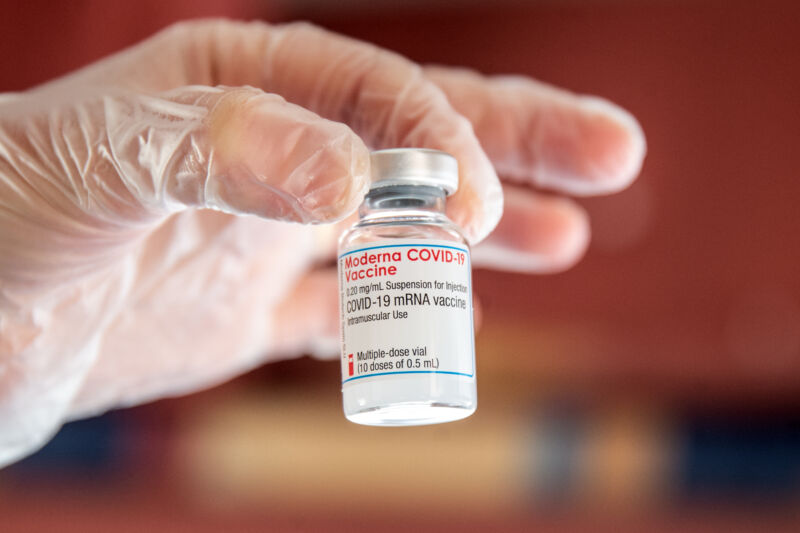The first doses of omicron-specific COVID-19 vaccines went into the arms of clinical trial participants this week. This took place just as the towering wave of cases from the ultratransmissible coronavirus variant appears to be cresting in the US and experts are unsure of what to expect next.
Leading mRNA-based vaccine makers Moderna and partners Pfizer and BioNTech each announced this week that they had dosed their first trial participants. The tweaked vaccine doses update existing formulations to match the mutations found in omicron's spike protein rather than the spike protein present in an earlier version of SARS-CoV-2.
The companies all emphasized that three doses of existing vaccines—two doses in the primary series, followed by a booster dose—are holding up against omicron. The doses provide strong protection from severe disease, hospitalization, and death, say the companies. Last week, the Centers for Disease Control and Prevention published data suggesting that three doses are 82 percent effective at preventing visits to urgent care clinics and emergency departments for COVID-19. Three doses, the CDC added, are also 90 percent effective at preventing hospitalization.
However, protection from infection has taken a significant hit from the highly mutated variant. In general, antibody levels that ward off infection naturally wane over time. With so many people boosted months before omicron's peak, defenses are down. Additionally, omicron is able to evade some immune defenses from vaccines and past infections, lowering protection from infection further.
"Vaccines continue to offer strong protection against severe disease caused by omicron. Yet, emerging data indicate vaccine-induced protection against infection and mild to moderate disease wanes more rapidly than was observed with prior strains," BioNTech CEO Ugur Sahin said in a statement. The new omicron-specific vaccine is aimed at spurring "a similar level of protection against omicron as it did with earlier variants but with longer duration of protection."
Uncertain future
Pfizer and BioNTech are testing their omicron-specific vaccine in a trial with 1,420 participants. Participants are split into three groups. In one group, 615 participants who have had just two doses of the existing vaccines will get one or two omicron-specific boosters. In a second group, 600 people who already have three doses of existing vaccine will get an omicron-specific booster. And in a small third group, 205 people who have not been vaccinated at all will get three doses of the omicron-specific vaccine. The companies hope to have the omicron-specific booster ready for use in March.
Moderna has begun a smaller trial with its omicron-specific vaccine, involving 600 patients in two even groups. One group will include people who have received just two vaccine doses previously, while the other will include people who have had three. Like Pfizer and BioNTech, Moderna also hopes to have the new omicron-specific vaccine ready by March.
"We are also evaluating whether to include this omicron-specific candidate in our multivalent booster program," Moderna CEO Stéphane Bancel said in a statement, referencing the company's development of a vaccine that would address multiple variants in one shot.
Bancel has also previously discussed Moderna's goal of producing a seasonal shot that would cover seasonal flu and another seasonal respiratory virus, RSV, in addition to the pandemic coronavirus. However, development of such a shot is a long way off; mRNA-based vaccines for RSV and seasonal flu are not yet developed.
Overall, it's still not certain if an omicron-specific vaccine and/or seasonal COVID shots will be necessary—and, if they are, for how long. While vaccine makers are preparing for more jabs, experts are divided on what to expect after the current record-breaking wave. Some experts have openly hoped for a lull in transmission and an end to towering peaks. Others, including the World Health Organization, point to the continued risk that more variants will emerge—variants that could potentially outcompete omicron and thwart all our vaccines. The only aspect most experts seem to agree on is that the pandemic coronavirus will, at some point, settle into endemicity. That means COVID-19 will continue to circulate but at low levels that generally do not disrupt daily life at a population level or overwhelm health care systems, as is happening now. But when that will happen and what will happen until then remains unclear.



3175x175(CURRENT).thumb.jpg.b05acc060982b36f5891ba728e6d953c.jpg)

Recommended Comments
There are no comments to display.
Join the conversation
You can post now and register later. If you have an account, sign in now to post with your account.
Note: Your post will require moderator approval before it will be visible.